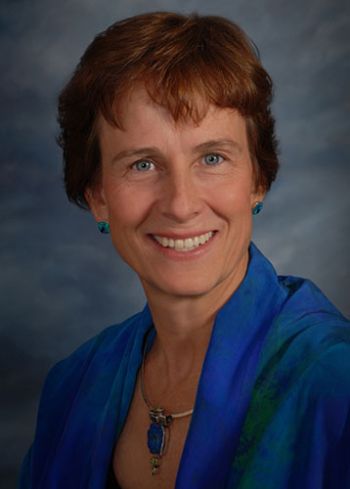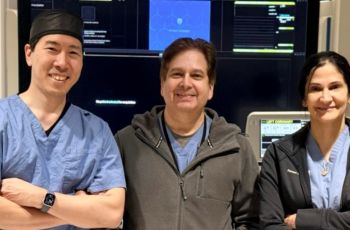
Christina Puchalski, M.D. '94, RESD '97, director and founder of the George Washington University (GW) Institute of Spirituality and Health and professor of medicine at the GW School of Medicine and Health Sciences (SMHS), has received a $558,502 grant from the John Templeton Foundation. The project, titled “GWish Templeton Reflection Rounds II: Sustaining Spirituality-based Competencies in Medical Education,” is also led by Jim (Benjamin) Blatt, M.D., professor of medicine at GW SMHS, and Ann Doucette, Ph.D., research professor at the GW Columbian College of Arts and Sciences.
This is the second major grant supporting the incorporation of mentored reflective practice into the mainstream clinical schedule of clerkship medical students, through Reflection Rounds. The purpose of Reflection Rounds is to foster students’ inner life development so they are prepared to address the emotional and spiritual, as well as biological suffering, of their patients. Spiritual is defined in a broad sense as what gives peoples’ lives meaning, purpose, and connection.
“Our hope is that through these rounds, medical students develop into excellent humanistic and compassionate physicians, as well as excellent scientists,” said Puchalski.
While in medical school, an emphasis is placed on the acquisition of the knowledge and skills needed to attend to the physical needs of patients. Less attention is paid to the larger question of personal and professional development and to students’ values, beliefs, sense of self, and self-transcendence. Students often learn that patient-centered care is important and that altruism is a basic core value, yet in their personal encounters with patients, development of these core values is often less emphasized or supported. In a recent consensus process, attention to personal formation as part of the professional development of a clinician was cited as a requirement of clinical training. Attention to personal formation, which is the mission of Reflection Rounds, allows students to focus on their inner life, their call to serve others, and how that call is affected by their experience with patients.
“This ability to reflect is critical to practicing with integrity, accountability, compassion, and respect for others,” said Puchalski. “With the guidance of highly experienced faculty mentors, students share their experiences and perspectives with others and then listen as others share their experiences. This fosters the inner growth needed for them to become compassionate physicians.”
Reflection Rounds are held once per week for a four-week designated clinical rotation, held throughout the entire third year of medical school. Each two-hour round includes specific learning objectives linked to the National Competencies in Spirituality and Health, which are used to address four areas of concern with regard to medical students: burnout, depression, spiritual well-being, and patient centeredness.
This program is a first step towards introducing and standardizing the spirituality based whole person competencies, skills, and behaviors taught in U.S. medical school curricula. First developed in 2009, Puchalski, Blatt, and Doucette created the rounds curriculum, issued a competitive request for proposals, awarded grants to eight schools, trained faculty, and piloted the reflection rounds with approximately 800 third-year medical students. Findings from the pilot indicated that medical students welcomed this opportunity to address the whole person — body, mind, and spirit — in clinical care, and to be supported in their need to live balanced and authentic lives. Based on their previous success, this recent installment will support continuation of the program through 2014.


